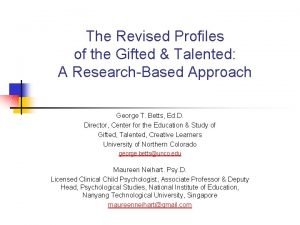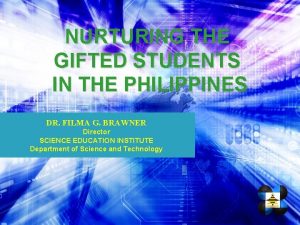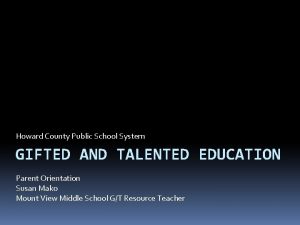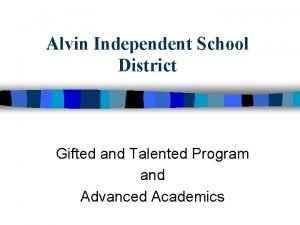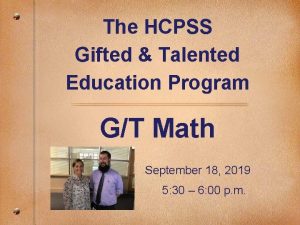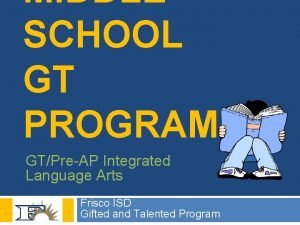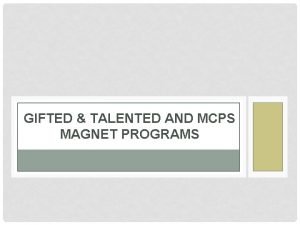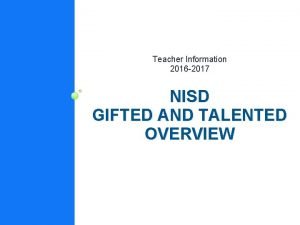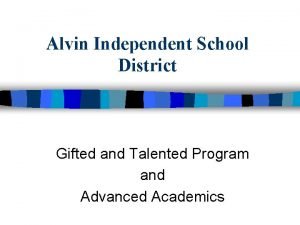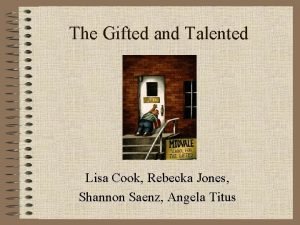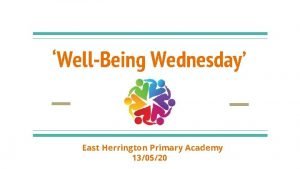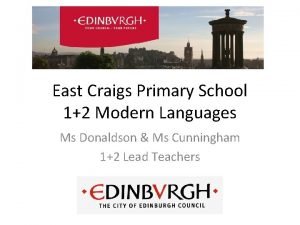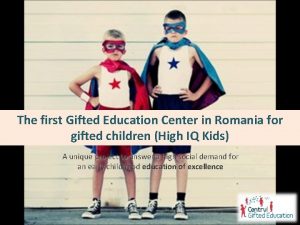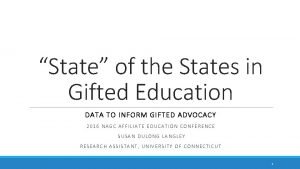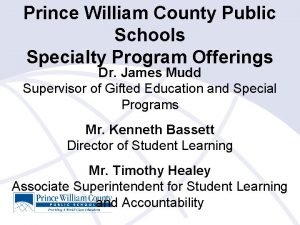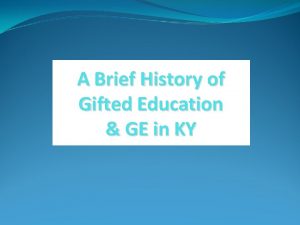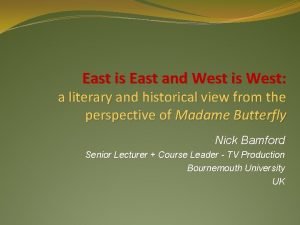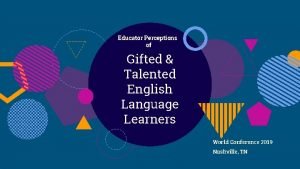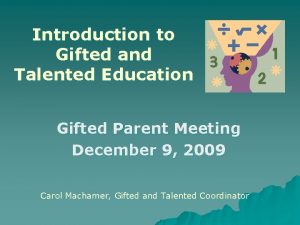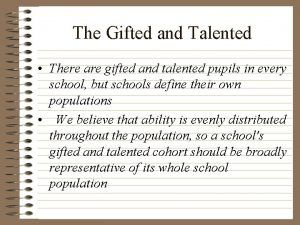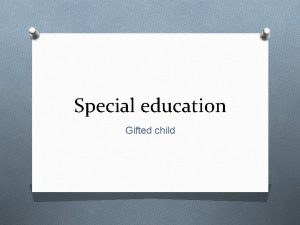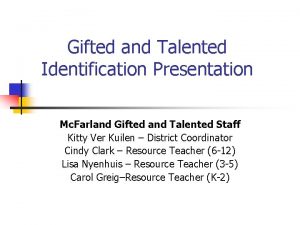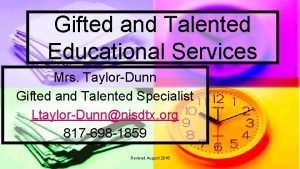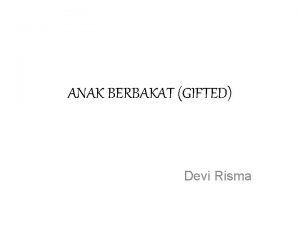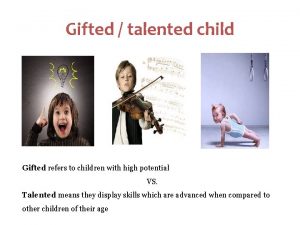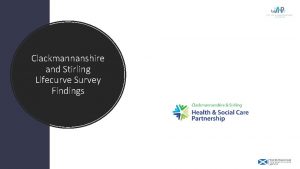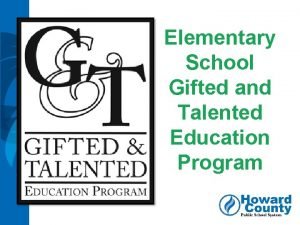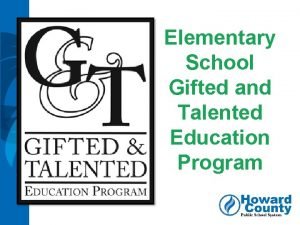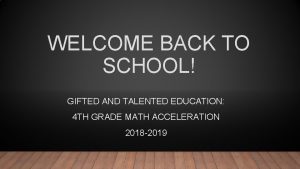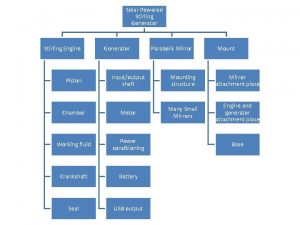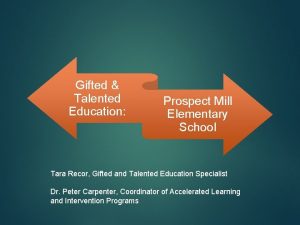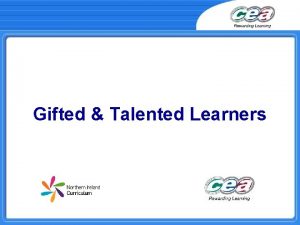GIFTED AND TALENTED EDUCATION STIRLING EAST PRIMARY SCHOOL




















- Slides: 20

GIFTED AND TALENTED EDUCATION STIRLING EAST PRIMARY SCHOOL 2009

OUTLINE OF SESSION • Introduction • Overview of DECS policy statement (Updated 2007) • The school’s Gifted Student Policy • Implications for our students • My role as the Gifted and Talented teacher • My beliefs • Gifted and Talented Sessions • Conclusion

My background • Bachelor year-specialized in Special Education and Gifted and Talented • Teaching for 18 years here with overseas experience • Levels taught - Reception to Year 7 and junior secondary • School roles - Special Needs Teacher (R-7) Classroom Teacher (R-5) Relief Teacher (R-7) • School settings - Special schools, country, city (lower socioeconomic) and hills

Department Policy Statement • Designed to enable all gifted and talented learners to achieve their full academic, personal and social potential. Applies to all DECS schools and preschools. • Offers guidance with identification, provision of appropriate curriculum, pedagogy and educational pathways. • Based on Gagne’s definition of giftedness and talent. • Relates to other department policies and plans i. e. South Australia’s Strategic Plan 2004 -2014: to improve student’s learning outcomes, psychological wellbeing and retention. • States that all gifted and talented students need a learning environment that fosters well-being and learning outcomes consistent with their abilities. This can be provided through appropriately challenging enrichment, extension and acceleration experiences.


Identification process • Identification of gifted and talented learners should occur as early as possible and must be reliable, defensible and congruent with current research and site policies. • Impetus for implementing appropriate learning programs. • Comprehensive criteria and a balance between objective and subjective assessments will ensure inclusive screening (page 4/5). • Screening strategies include: observation, standardized achievement tests, cognitive/intellectual tests, interviews, anecdotal evidence, checklists of traits and characteristics (page 13 -17).

Curriculum Differentiation • A differentiated curriculum caters for a wide range of learning styles, readiness and ability levels within a mainstream classroom and is necessary for gifted and talented learners. • Most gifted and talented learners will be taught in mainstream classes using differentiated curriculums. • Appropriate placement/curriculum will influence these students motivation, engagement and social/emotional well-being. • Key elements include: Pace (accelerated progress through the curriculum ) Level (complex/abstract concept based activities) Grouping (supports positive social and emotional development of gifted and talented students and advocates opportunities for them to interact with peers who have similar abilities) Assessment (important ongoing diagnostic tool for matching instruction to learner needs)

Curriculum differentiation • Provisions for gifted and talented students need to include opportunities for enrichment, extension and acceleration in and beyond the classroom. • Enrichment: cluster groupings, community programs (page 6). • Extension: activities at greater breadth and depth and higher order thinking skills such as Bloom’s Taxonomy, Creative Problem Solving and Moral Dilemmas. • Acceleration: early and flexible entry into all levels of education, specialist secondary schools, composite class placement, subject and year-level acceleration and tertiary extension and enrichment pathways.

Implementation IEP • Individual Education Plans (IEP) are done for students whose abilities are not able to be catered for within the regular classroom curriculum and done/reviewed yearly. • Of value for learners who are: 98 th percentile or above, display uneven (asynchronous) development, have a learning disability that requires targeted support, early entry/accelerated and those requiring significant social/emotional support. • Are developed collaboratively with educators, student (where appropriate) parents/caregivers and other relevant professionals. • Gifted and learning disabled learners (GLD) require special consideration in order to support development in both their strengths and weakness (autism, dyslexia, ADD/ADHD ).

Decs policy • To be reviewed before July 2010 • Gifted and talented learners have the best opportunity to realise their full potential when parents/caregivers and educators work together taking into consideration the complex range of issues that can impact on their cognitive, emotional and social development. (cultural/socioeconomic, underachievement, perfectionism, isolation, lack of motivation, depression and stress from very high expectations) • These students can make significant contributions to their schools and the wider community when appropriate curriculum is provided to engage and challenge their abilities and develop their talents. • (GERRIC) www. arts. unsw. edu. au/gerric/

Our school policy • It is our professional obligation to provide a learning climate/experience that effectively supports the individual requirements of every student. • Policy was developed to meet the learning and social/emotional needs of gifted students as they have the potential for unusually high performance in at least one area. They are an extremely diverse group with unique characteristics and educational needs. • School’s policy is one of programming for gifted learners rather than a “Gifted Programme” • Uses Gagne Differentiated model of Giftedness and Talent. (2003) Top 10% • Gift-natural abilities/aptitudes significantly beyond same aged peers with outstanding potential • Talent-demonstrated achievement/performance significantly beyond same aged peers.

Our school policy • Uses a variety of reliable and valid data collection processes for identifying students (Subjective/Objective) as per DECS policy. • Aims to identify and support as many of the gifted and talented students at school as possible as they are not always successful learners without intervention. Giftedness does not equate to automatic success. The child’s personality and the environment helps or hinders the translation of potential into performance. • Classroom curriculums are differentiated by modifying the following: use of pre/post testing, content, process, product, learning environment, compacting and by the use of individual contracts. Teachers integrate R-7 Scope Sequence into their teaching (last page of policy). • IEP are used as per DECS policy

Implications for students • Our policy encourages and provides gifted students with: • Daily challenges in their specific area(s) of talent. • Opportunities to work independently in their areas of passion and strength. • Opportunities to spend time socializing and working with like-minded peers. • Enrichment/Extension activities : Tournament of Minds, Variety of Competitions, Oliphant Science Awards, Chess Club, Debating Team weekly withdrawal sessions and school leadership opportunities. • Acceleration as required. (see notes in folder) • A curriculum that maintains their enjoyment and allows for individual progression at own pace.

Gifted and Talented my role • 2009: my third year at Stirling East Primary • Part-time: two and a half days a week (1 day allocated for G&T) • Dual role of special needs and gifted and talented teacher. • Withdrawal of individuals and small groups for enrichment activities. • This year there are 18 students involved in the programme comprising of 4 groups. • Lessons run for between 45 mins (junior students) and 1 hour (middle/upper school) and take place in my room or library. • Other responsibilities include: resourcing, off level testing of individual students, parent and teacher support, monitoring students.

• My Beliefs The uniqueness of gifted children renders them particularly vulnerable and IT is the mark of an educated mind to be able to entertain a thought without accepting it Aristotle requires apt modifications in parenting and teaching in order for them to develop optimally. (Columbus Group 1991) • Enrichment sessions aim to: • Empower students with the skills and positive attitudes they will need to be effective and independent learners in their life long learning journey (problem solving, research skills, time management and thinking skills). • Give students extra opportunities to express and celebrate their unique ideas and abilities. • Provide opportunities which increase self-esteem, confidence and risktaking skills.

• In my sessions I: • aim to engage students in a wide range of creative (generation of ideas), critical (evaluation) and problem solving tasks. • Our greatest glory is not in never falling in rising every timeuse we fallof. Confucius provide opportunities for students tobut expand their the language of thinking and application of higher order thinking skills from a variety of models. • provide opportunities to extend specific interests with activities such as robotics, painting, poetry, K’nex, story writing, cooking and competitions. • utilize a wide variety of challenging brainteasers: lateral thinking puzzles, logic problems, fluency activities and visual riddles etc • am flexible but operate with structure and routines. • develop students reasoning abilities by encouraging discussions which consider serious moral issues in an imaginative and stimulating way (Philosophy). My sessions

A session outline You must be the change you wish to see in the world mahatma gandhi • Degree of giftedness will dictate the degree of differentiation. • Incorporates explicit teaching as required of: thinking skills, problem solving strategies and research skills. • Collaborative/cooperative skills : important competency • A year 3/4 1 hour lesson outline would look like this: • Reflective writing/brain candy activity • Maths problem solving • Literacy activity: vocab extension, fluency task, proverb brainteaser • Lateral thinking problem / visual riddle • On-going theme work/independent research

in conclusion Reason can answer questions but imagination has to ask them Ralph Gerald • Gifted children feel and think differently from their peers. Emotional aspects of their educational journey are as important as their cognitive needs if their gifts are to be developed and talents celebrated. • Achievement in the cognitive domain is directly related to a child’s self- esteem. (Hollingworth 1942) • What do we want for our gifted students? • Intrinsically motivated, caring, happy and enthusiastic autonomous learners with positive self concepts who are psychologically healthy and prepared for the leadership opportunities the future holds. • Positive attitudes plus action leads the way to success.

references • Margaret Bishop (2007) Gifted and Talented Children’s Association SA • Hollingworth, L (1942) Gifted Children New York: Macmillan • Lesley Henderson, Flinders University • Senate Enquiry (2001) Canberra ACT • Michael Pohl (2000) Teaching Complex Thinking Hawker Brownlow Infusing Thinking into the Middle Years (1997) Learning to Think: Thinking to learn (2000) • DECS Policy Statement (2007) • Louise Porter (2005) 2 nd edition Gifted Young Children Allen&Unwin

 The anderson school gifted and talented nyc
The anderson school gifted and talented nyc Profiles of the gifted and talented
Profiles of the gifted and talented National program for gifted filipino
National program for gifted filipino Howard county gifted and talented
Howard county gifted and talented Alvin isd gifted and talented
Alvin isd gifted and talented Hcpss gifted and talented
Hcpss gifted and talented Frisco gt prepartion program
Frisco gt prepartion program Howard county gifted and talented
Howard county gifted and talented Http//bit.ly/mcps-parentinput
Http//bit.ly/mcps-parentinput Nisd gifted and talented program
Nisd gifted and talented program Alvin isd gifted and talented
Alvin isd gifted and talented Gifted vs talented
Gifted vs talented East herrington primary school
East herrington primary school East craigs primary school
East craigs primary school Gifted education center
Gifted education center State of the states in gifted education
State of the states in gifted education Prince william county gifted program
Prince william county gifted program History of gifted education
History of gifted education East is east and west is west
East is east and west is west Midvale school for the gifted
Midvale school for the gifted Bell high school gifted program
Bell high school gifted program

